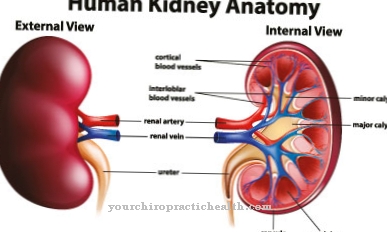As Liver failure or Hepatic insufficiency is the term used to describe the complete functional failure of the human liver, which, depending on the specific form and cause, can lead to the death of the person concerned after just a few weeks.
What is liver failure?

© yodiyim - stock.adobe.com
As one of the largest human organs responsible for metabolism, the liver has several vital functions. This includes, for example, the storage of essential substances such as fat-soluble vitamins, the detoxification of the body and the conversion of sugar molecules.
Liver failure would have serious consequences for the functionality of the human body. In view of the different causes that come into question, different forms are differentiated; in particular, these are acute and chronic liver failure and, as an intermediate form, the subacute form. The acute form occurs suddenly and leads to severe liver dysfunction just a few days after the outbreak.
As a rule of thumb, patients who are not treated quickly enough will lose their liver after four weeks, with the result that it will have to be surgically removed. In addition, there is also chronic liver failure, which occurs over a longer period of time. Sometimes it can take several years before the first noticeable functional disorders and finally their failure of the liver appear.
Since the respective courses can turn out differently due to the different causes and triggers of liver failure, the subacute is still recognized as an intermediate form of acute and chronic liver failure.
causes
A wide variety of reasons come into question as possible causes. In acute Liver failure Infection with special viruses is often to blame for the outbreak of the disease. These include the hepatitis viruses and some herpes simplex viruses.
However, it is not always just disease-causing viruses that play a role. Rather, another possible cause is poisoning of the body with drugs. Above all, excessive consumption of alcoholic beverages and types of alcohol that are not suitable for consumption can lead to severe liver damage and even liver failure.
Chronic liver failure, on the other hand, is rarely due to acute viral infections. Here there is often an underlying disease that also affects the liver and, in extreme cases, can lead to liver failure.
Symptoms, ailments & signs
There are a variety of symptoms that can indicate liver failure. These can occur singly or in combination and increase in intensity in the course of the causal disease. In the early stages, liver insufficiency is manifested by dizziness, loss of appetite and exhaustion, among other things. Those affected also notice a swollen stomach and suffer from diarrhea and vomiting.
As the disease progresses, jaundice sets in. Then external changes develop, such as yellow skin, sunken eye sockets, and a generally sickly appearance. The white in the eyes (sclera) is also typical. Then there are also changes in facial expressions - the facial features change and the eyelids begin to flutter noticeably.
Associated with this, [[edema9] s develop in the arms and legs. At the same time, mental performance also decreases. The affected person can no longer concentrate, gets tired quickly and keeps falling asleep all of a sudden. In addition, there are blood clotting disorders that can be recognized by reddish bleeding under the skin. Ultimately, liver failure leads to kidney failure or hepatic coma. The patient eventually dies from organ failure.
Diagnosis & course
There is justified suspicion Liver failure or even just for liver disorders, the attending physician has a number of diagnostic measures available. The simplest and least side-effect measure is to scan the right side of the abdomen, where the liver is located, and to visualize the liver using radiationless ultrasound.
Since the liver becomes significantly enlarged in the event of liver failure, this fact can be a reason for the doctor to carry out further tests. If the cause is a hepatitis infection, the affected person's skin turns yellow, which is also a point of contact for the doctor. It is also known that the liver is responsible for converting sugar molecules.
Conversely, this means that if the patient's blood count indicates hypoglycaemia, there could be a malfunction of the liver in the regulation of sugar conversion, which would further substantiate the suspicion of liver failure.
Complications
In the worst case, liver failure can lead to death. With this complaint, those affected primarily suffer from severe jaundice and biliary obstruction. The eyes and skin turn yellow and are a direct indicator of liver failure. Because of this, a quick diagnosis can also be made in most cases.
Fluid builds up in the abdominal cavity. Liver failure can also lead to kidney failure, in which the affected person usually dies after a few days if this is not treated. The patients are then dependent on dialysis or a kidney transplant. Legs and arms can also tremble and people often suffer from a fever. The patient's quality of life is significantly reduced by liver failure.
Liver failure usually requires a liver transplant. Until then, the functions of the liver are maintained with artificial machines. As a rule, there are no particular complications. However, even with a transplant, the course of the disease will not always be completely positive. In many cases, the life expectancy of those affected is significantly reduced due to liver failure.
When should you go to the doctor?
People who experience repeated dizziness, vomiting, nausea, or general malaise should see a doctor. In the event of loss of appetite, a decrease in the usual level of performance or an increased need for sleep, a doctor's visit is necessary. If there is swelling at the stomach level or changes in the skin texture, there is cause for concern. A yellowish colored exterior indicates an irregularity that should be investigated. If edema develops or irregular bowel movements are noticed, the observations should be discussed with a doctor. Circulatory disorders, cold limbs or interruptions in the heart rhythm should be examined and treated.
Changes in the eyes or facial expressions are to be understood as a warning from the organism.If the eyes are white or the usual facial features are abnormal, a doctor should therefore be consulted immediately. Jerks and tremors of the eyelids should be presented to a doctor as soon as the symptoms persist for several days or weeks. Changes in memory performance are also worrying. In the event of a memory impairment or the inability to access acquired knowledge, a doctor's visit must be urgently made. Since liver failure can be fatal, a doctor should be consulted at the first health impairment. If pain sets in, if you experience insomnia or a sickly appearance, a visit to a doctor is advisable.
Treatment & Therapy
The most important thing about the treatment of Liver failure is first and foremost that it must be done immediately. If the liver has already given up its functions completely, every treatment revolves around preserving life.
After all, liver tissue that has been damaged cannot be regenerated. It is therefore only a matter of artificially maintaining the vital functions of the liver using medical instruments until the affected person receives a replacement liver transplanted from a donor. In order to protect the organism, the patient has to forego normal food.
Since the human gastrointestinal tract is closely connected to the liver, every digestive process would strain the liver, which is no longer functional and would therefore only worsen the course of the disease. Essential substances that the body needs are injected directly into the bloodstream through infusions. The regulated supply through infusions can also keep the sugar balance at a normal level, which the liver is otherwise responsible for.
It is also important that cerebral edema can develop in the event of liver failure, i.e. water retention in the central nervous system. That is why the patient's brain must be constantly monitored.
You can find your medication here
➔ Medicines for jaundice and liver problemsOutlook & forecast
The liver carries out vital metabolic functions in the human organism. These cannot be taken over by other organs. If the liver fails, threatening conditions can arise. If treatment does not take place immediately, the prognosis is poor. From a statistical point of view, a young age of the patient and a low level of underlying diseases speak for better chances of recovery. A susceptibility to liver failure can be found in people who take the wrong medication. Chemotherapy can also play its part. Those who eat unhealthily also contribute to liver disease.
In about half of all cases, only one transplant can cure the condition. Those affected maintain their vital function through dialysis. Scientists have classified the duration of liver failure. While the failure of a so-called fulminant liver failure extends to a maximum of one week, chronic liver failure represents the maximum possible extent.
Patients then suffer from the disease for months. According to the classification, the threat of liver failure also increases. The typical signs are increasing. Failure to treat it inevitably leads to a poisoning process in the body. Damaged tissue in the liver always has a negative effect. Because they can no longer be regenerated.
prevention
Liver failure is one of the diseases that can be prevented relatively well. These include, for example, hepatitis vaccinations to prevent the onset of the disease even when infected with hepatitis viruses. In addition, by avoiding drugs and using alcohol responsibly, damage to the liver and thus liver failure can be successfully prevented.
Aftercare
In most cases, there are no special follow-up options available to those affected by liver failure. It is a serious condition that needs to be treated by a doctor. If liver failure is left untreated, death usually occurs. Therefore, patients should contact a doctor at the first signs and symptoms of this disease.
However, liver failure cannot always be cured, so that in many cases no further follow-up measures are necessary if the person concerned dies as a result of the failure. In the majority of cases, patients with this disease rely on a liver transplant. The person affected should definitely rest after such an operation and take care of their body.
In any case, strenuous or physical activities should be avoided in order not to delay healing. As a rule, a healthy lifestyle with a healthy diet also has a positive effect on the maintenance of the liver. Alcohol should also be avoided so as not to burden the liver. In many cases, however, liver failure significantly reduces the life expectancy of those affected.
You can do that yourself
To avoid liver failure in the first place, substances and foods that could damage the liver should be avoided. Anyone who already has liver disease should avoid drugs that damage the organ. When collecting mushrooms, the following applies: Do not eat unknown mushrooms.
Should the liver nevertheless become ill, the patient must take care of himself. A relief diet can be worked out in collaboration with a doctor or a nutritionist. The eating plan should mainly include plant-based foods such as artichokes, dandelions, Brussels sprouts and sage. Dark chocolate can also be eaten with the approval of a medical professional, because cocoa lowers blood pressure and alleviates the symptoms typical of liver disease.
Despite all these measures, acute liver failure can occur. Then the following applies: Alert the rescue service immediately. The person concerned must then be treated in a specialized center. If it goes well, you can slowly return to everyday life through operations, a strict diet and physiotherapy measures. Since acute liver failure is a life-threatening condition, consequential damage always remains - a conversation with a therapist and other affected persons helps here.

.jpg)



.jpg)
.jpg)






.jpg)

.jpg)
.jpg)











.jpg)